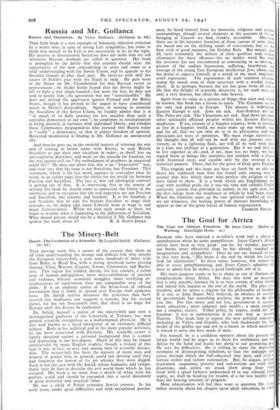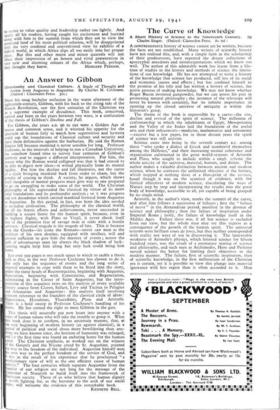The Goal for Atrica
The Case for African Freedom. By Joyce Carey. (Seeker and Warburg. Searchlight Books. 2S.) The Case for African Freedom. By Joyce Carey. (Seeker and Warburg. Searchlight Books. 2S.) READERS who have enjoyed a ncvelist's work feel a shiver of apprehension when he turns pamphleteer. Joyce Carey's African novels have been so very good: can he, we wonder, approach our brains more effectively than he has already touched one imaginations and sympathies? Does he not say himself of man in this very book, " His brain is the tool by which his feeling look for satisfaction." In these times, however, few writers are able to resist pamphleteering, and Joyce Carey's admirers will have to admit that he makes a good forthright job of it.
His main purpose seems to be to shake us out of illusions and complacencies about Africa. He does this with an assurance that is only possible because he is so very certain of what should, and indeed will, happen to the rest of the world. His plea is fot freedom, and he spares a chapter for his philosophy of freedom It is not, as John Stuart Mill believed, an absence of restraint by government, but something positive, the power to do what you like. For this more, and not less, government is needed: more education ; more industry and wealth ; a more comics not a simpler, society. Tribal polity, he argues, could not girt freedom : it was as authoritarian in its own way as moder: Nazism. This leads him to expose the new political romantic including de Valera and Gandhi, who look backwards for the,: model of the golden age and not to a future in which modemky is forced to serve the best needs of men.
For himself, he is a confident optimist about the present and future world, and he urges us to share his confidence and take Africa by the hand and hustle her along to our promising gear He sees the difficulties. He is willing to share the depressing estimates of disintegrating tribalism, to face the unhappy pro. cesses through which the half-educated may pass, and even 10 foresee strikes and violent nationalism. But, he argues, political frustration stagnation, poverty and soil-erosion are even morg disastrous, and, unless we attack them along their while front with a speed hitherto undreamed of in our colonial phik" sophy, we shall be heading for trouble of a far less healthy kind than the bracing tensions of progress.'
Most educationists will feel they want to question Mr. Care! rather severely about his chapter upon adult education, in which be seems to value quality and leadership rather too lightly. And nearly all his readers, having caught his excitement and hurried along with him to the summit from which they are to view the promised land of his main political solution, will be disappointed with the very confined and conventional view he exhibits of a federal world, in which Africa slips all too easily into her proper place. But this and other major and minor quarrels will not efface their impression of an honest and vivid presentation in very new and alarming colours of the Africa which, perhaps,



































 Previous page
Previous page